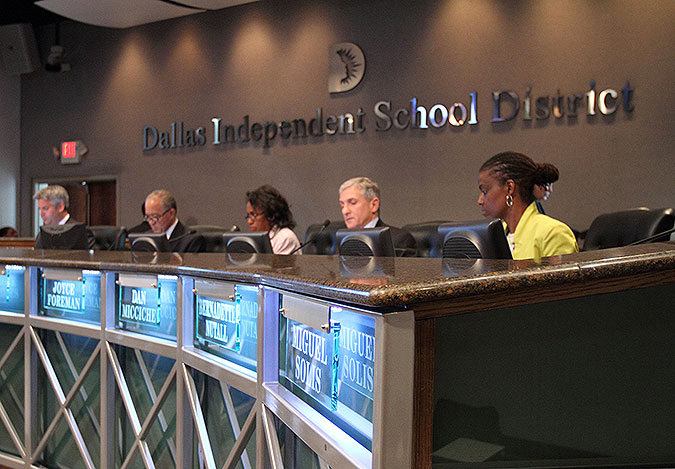Last week, I shared with you one idea for the Home Rule Commission to consider in a new charter for Dallas ISD. Since the HRC’s most-selfish, status-quo member keeps monopolizing the discussion by advocating the commission do nothing, I’ll keep throwing up ideas suggested by forward-thinking educators, in North Texas and elsewhere. Even if the commissioners abdicate their legal duties, somebody’s got to present some options to help our students. So how bout this whopper for consideration:
Idea No. 2: board accountability.
We talk a lot about holding our elected officials accountable. What does that mean, especially in a public school context? What are we holding them accountable for? This gets to a truly fundamental question that we don’t often ask: What is the goal of the school board?
The answer seems obvious: The school board exists primarily to make sure our kids get a good education. We want students to achieve at high levels. All of them. Whatever that level is today, it should be higher in the future.
The problem is that the answer really isn’t that simple, not in day-to-day practice. Even though you can’t go eight minutes of any DISD school board meeting without a trustee saying that we must do more “for the children,” that’s not always their first concern. Not really.
This is not only true in Dallas. In a 2002 survey of school board members around the U.S., the No. 1 concern reported by board members was financial, not academic. Academic achievement was a very close No. 2. But the fact academics was anything but No. 1 is very telling.
So let’s look at what the law instructs school boards to do. We are, after all, a district governed entirely by the state (as opposed to, say, a home rule district). So what the state says is what should guide DISD.
The easiest place to figure out what the state thinks a school board should do is look at the state-developed policy establishing school board legal status, powers, and duties.
There are 19 mandatory and 13 optional powers and duties defined by the state. How many of these explicitly mention academic achievement (or anything related), instead of just using vague terms like “performance goals”?
One.
Only one of the 32 explicit powers of a school board has anything to do with academics. (And if you read it, it actually mentions academics alongside of fiscal concerns, so I guess that’s more like one-half.) How many deal with finances or resource utilization? Thirteen. In fact, six of the powers granted by the state have to do with community relations.
From a legal perspective, then, the state wants school boards to: 1) manage money; 2) make sure the public feels involved; and 3) if at all possible, educate kids.
Now, I know you’re thinking: “C’mon, man, nobody runs for the school board who doesn’t want our kids to learn how to read good and do other stuff good, too.” (Well, some of you are thinking that. Others are probably thinking: “Yeah, some of them only care about monetizing our children and ushering contracts to their rich fat-cat friends downtown.” To which, as always, I can only reply with this.)
Yes, of course people who run for the school board want our kids to get a better education. I’ve been extremely critical of trustee Bernadette Nutall as a trustee, but multiple people have told me that her summer learning program is outstanding and truly helps kids. I have no doubt she loves kids. Everyone wants the best for children.
But they also want a lot of other things. Quite frequently, those other things get in the way of getting our kids a better education. So it is that voters who must hold them accountable. And we should focus the brunt of our accountability toward progress in student achievement.
You think we do this now? No we don’t. I know this for two reasons: One, our student achievement hasn’t really gotten any better; and two, almost no trustees have been voted out of office.
Consider my first point by looking at the SAT and ACT test scores. These tests aren’t perfect, for reasons I talked about in my post about grit. But they are the only tests consistently given to our kids that allow for accurate comparisons across the state over a 20-year period that try to summarize aggregate education outcomes. In 1992, DISD was 6.1% behind the state on this test, but is now 8.6% behind the state. (Click here to see how I calculated this with a little help from the DISD board evaluation rules.) That’s bad. Our kids might be getting slightly better relative to our kids in the past, but our kids are getting worse compared to all the other kids in Texas with whom they will be competing to survive and succeed in the real world.
Consider point No. 2, that we don’t hold trustees accountable by voting them out of office. Since 1997, there have been 63 elections for trustee in Dallas ISD. The incumbent was defeated in only five of those elections — and three of those elections involved a Parrott. That means we as voters have been dissatisfied with Dallas ISD less than 10 percent of the time. This completely reflects the twin powers of apathy and inertia, which seem to be the determining factors in the electoral fortunes of Dallas school board trustees.
That’s just one metric, you say? Well, is there any research that would suggest voters hold their school boards accountable based upon how well students perform? This study tells us the answer is, generally, no. (Unless things have changed radically since 2008.) What wins the day in elections is the broad array of education-related items covered in the media. This might include student outcomes, but it also includes things like teacher pay, budgets, sports, racial issues, student discipline, school closures, etc. If the big issue in the media isn’t student outcomes, then voters generally don’t vote with that in mind.
Where does this leave us?
1) School board members don’t think they are there primarily to boost student outcomes.
2) State law doesn’t think school board members are there primarily to boost student outcomes.
3) Voters are guided by the media, and the media don’t usually think school board members are there primarily to boost student outcomes.
This brings us back to the home rule charter. Is there a way for us to alter the structure of the school board so that it stays primarily focused on boosting student outcomes?
Yes. Call special elections based solely on student outcomes. Here’s one suggestion of how it could work:
Let’s say we keep our Dallas ISD board set up so that three trustees are elected every May. (I don’t think we should do this; this is just a hypothetical). Every November, the state releases accountability data for Dallas ISD and for the state as a whole. The home rule charter could stipulate that each year in November, we do a basic comparison of where DISD stands versus the state by looking at the difference in the average passing rate on STAAR (for every test) in Dallas versus the statewide average. Then we look back, say, five years prior. If we’ve closed the gap on the state average, awesome, we sippin’ Zinfandels. (I’m guessing the actual charter document won’t quote Lil’ Kim, but you get my point.) If the gap has widened – if we’ve lost ground relative to the state – then the upcoming May election should be held for all nine trustees instead of just the three whose term is up.
Think of what this would do to media coverage, and think of how that relates to the research. Local news coverage would focus on the release of the state data, wondering if indeed poor student achievement data will trigger a special election. If it does trigger this election, wowzers. The local media would (rightly) go full-court press on coverage. This electoral mechanism pretty much guarantees that student achievement becomes the No. 1 issue in the upcoming election, and school board members will be judged accordingly by voters.
Does this mean voters will throw out incumbents more often? Who knows? Some board members might be new to the board. Some might possess a clear vision for improving student outcomes. But every single candidate will need to talk about student achievement, and they will be judged by the voters on how they intend to improve outcomes for our kids. This would be a very welcome change from the status quo. If the folks in charge of the system stay focused on improving student outcomes, that will likely mean good things for our kids, which will compound over time.
Now, I understand there are big concerns for this scenario, for reasons real and imagined. Let’s start with the imagined reasons:
Some argue that explicit accountability for student achievement may increase the desire for trustees to meddle in the district’s operation (something I have railed on because board micromanagement is a very bad thing). But this case doesn’t hold water. For one, we’re talking about holding the entire board accountable, not just an individual trustee. There’s no real reason to intervene just in your own part of town if failure anywhere is failure everywhere. If anything, you’ll want to intervene everywhere, but the district is too big for that. Plus, there’s a new incentive for trustees to crack down on rogue trustees. If a trustee wants to go wild with micromanagement in his/her own part of town, why would other trustees let that happen when they know that any failure means they’ll face the consequences at the ballot box?
The bigger issue is this: The board is already SUPPOSED to be accountable for student achievement, and they are SUPPOSED to chart a strategic course while relying on the superintendent they hire to execute. If someone argues that the superintendent – who doesn’t teach, and doesn’t run any individual school – can be held accountable for student performance, then the people who hire and fire that superintendent can likewise be held accountable for student outcomes. People who argue against trustees being held accountable for student achievement are basically saying the school board doesn’t exist to raise student outcomes, but exists for other reasons. Which is precisely the governance problem we’re trying to solve.
Another imagined problem gets back to the whole grit thing. We know that these tests can’t possibly take the measure of a whole child. They measure narrow academic content areas and skip all the other great impacts educators in DISD have on kids. I get that as a problem. But we’re not kicking people out of office over the issue, nor are we taking any other issues off the table. This special election tool will simply elevate student academic outcomes to be top of mind for the voter, in the event Dallas’ kids are academically falling relative to the rest of the state. It’s also important to remember that this same testing weakness is in every district throughout the state. We would be measuring core academic content in our kids versus core academic content in kids throughout Texas. So unless we think we in Dallas are growing magically resilient kids who simply fail academically at higher and higher rates compared to the kids in the rest of the state of Texas, the criticism should derail the idea.
Another imagined problem relates to poverty. We know that poverty has a massive effect on educational outcomes. Generally, the higher the percentage of kids living in poverty at a school, the worse the school does. So, if Dallas ISD becomes much poorer over time relative to the state, then one would expect its outcomes to worsen compared to the state. Some might think it isn’t fair to judge trustees on student achievement because of that. That’s silly. First off, DISD is already 89 percent poor. There’s not a lot of room for it to get much poorer. Second, there’s so much talk in our country (and our city) of holding teachers and principals accountable for performance, do you really want to argue: “Yeah, you teachers can get fired if students don’t do well, but the politicians are safe.” Third, within DISD and throughout the state, there are schools that get outcomes WAY above what one would expect given their level of poverty. (One example is the Momentous Institute, which I will be writing more about in upcoming weeks, and which has just started a pilot program in Fort Worth ISD to help establish their learning strategies in a large urban district.) We want our schools to be those schools. That’s what we WANT our trustees to do. So, please, don’t argue that we should cut our politicians a pass if they don’t help focus all the time and attention of our school system’s management on transforming under-performers into over-performers.
What about real problems? Those basically come down to the concept of the board as a team. (The state, recall, grants no board member authority; only the board as a whole.) With this special election mechanism, the board will rise or fall together. Every trustee has to face a special re-election if the district fails to help kids; or, if they have helped our kids, then no trustee faces a special election. But what if one board member goes completely outer limits nutbar and starts barking orders at people, tries to steer contracts, tries to protect certain employees, or commits any other mortal sin of micromanagement? (Not saying that already happens. IJS.) There has to be something to help the board enforce team cohesion, otherwise the whole institution will flounder, student achievement will not raise, and everybody will constantly face special elections. Well, fear not dear reader, I have a solution for this problem, which I will recommend in my next piece, if I don’t get fired from D Magazine in the meantime for not contributing to the magazine proper.
Until then, feel free to comment or send me your take ([email protected]) on this idea, or give me more suggestions. I’ve got a pile of them I’m working through now. Even better, email a home rule commissioner and tell them you want to buy him or her an adult beverage so you can discuss how these ideas can improve our school system’s problems. It’s the most important email you’ll send all week, you can be sure.





